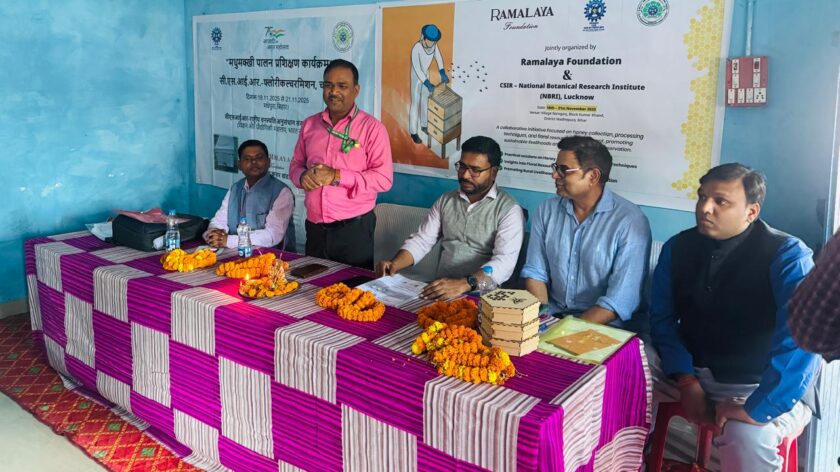CSIR–NBRI and Ramalaya Foundation launch a pioneering initiative in Ramganj, blending scientific beekeeping with ecological restoration to boost farmer incomes and strengthen rural environmental sustainability.
Madhepura, Bihar | 18 November 2025
Bihar has marked a significant milestone in sustainable agriculture and rural ecological development with the launch of its first Scientific Honey Production and Biodiversity Restoration Project in Ramganj village, Madhepura. The initiative is being undertaken under the CSIR Floriculture Mission – Phase II, spearheaded by Mission Director Dr. Ajit Kumar Shasany, and implemented by the CSIR–National Botanical Research Institute (NBRI), Lucknow, in collaboration with the Ramalaya Foundation, founded by Shri Prashant Kumar.
The launch program witnessed the participation of officials from the District Administration, Block Development Department, Forest Department, and experts from the Krishi Vigyan Kendra (KVK). Additional technical expertise was offered by Mr. Manoj Kumar, Block Project Manager, Jeevika, Kumarkhand, and Mr. Nimit Singh, Founder of Madhumakhi Wala Industry, Lucknow. Their involvement underscored the strong interdepartmental cooperation driving this initiative, aiming to uplift rural livelihoods and revive the ecological balance of the region.
District Magistrate Shri Taranjot Singh, IAS, commended the project as a meaningful and forward-looking model for sustainable ecological development. He assured full administrative assistance and expressed his plans to personally visit the project site to interact with scientists and farmers, reflecting the administration’s dedication to rural progress and environmental renewal.
Speaking about the initiative, Shri Prashant Kumar, Founder of the Ramalaya Foundation, said, “Our vision is to build a self-reliant model that strengthens biodiversity while enhancing farmer income. By merging scientific beekeeping with ecological restoration, we aim to empower communities and protect the environment. We sincerely thank CSIR–NBRI for their invaluable expertise and partnership.”
The scientific leadership of the project lies with Dr. Sushil Kumar and Dr. Bikarma Singh, Principal Scientists at CSIR–NBRI, along with Project Associate Prabhat Maurya, who will supervise training and field execution.
Dr. Sushil Kumar noted that Ramganj possesses tremendous ecological potential for scientific honey production, and that modern beekeeping techniques can simultaneously boost farmer incomes and preserve the region’s biodiversity.
Dr. Bikarma Singh emphasized that scientific beekeeping not only enhances honey output but also strengthens the entire ecosystem, adding that farmer training in modern apiculture and ecological restoration is key to the long-term success of the project.
Under this initiative, a biodiversity zone covering a 2 km radius will be developed with the installation of 200 scientifically managed bee boxes, targeting a 30–50% rise in farmer income. Over the next three years, the project plans to integrate over 200 additional farmers, expand operations to multiple blocks of Madhepura, and increase plantation activities across 20–30 hectares, building a resilient ecosystem and fostering sustainable rural livelihoods.
